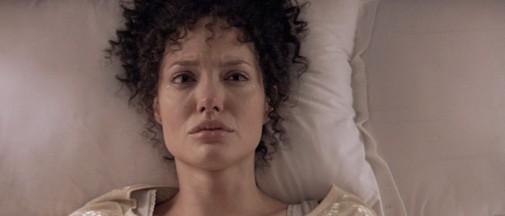
There are few true stars in contemporary Hollywood. Angelina Jolie is arguably one of them, part of a dying breed of movie mythology. Not that it means she's a prolific thespian. For that matter, it's pretty sad how the actress has started to evade our screens in recent years, headlining fewer and fewer projects as time goes by. That being said, Jolie is back in theaters right now, thanks to The Eternals, where she plays an immortal goddess-like figure. It's a delightfully obvious casting choice. In celebration of this occasion, we shall look back. Look back to a time when this Oscar-winning powerhouse was at the high of her visibility and popularity, but the Academy ignored her just the same. In 2007, Jolie seemed like a likely Best Actress nominee for Michael Winterbottom's A Mighty Heart…
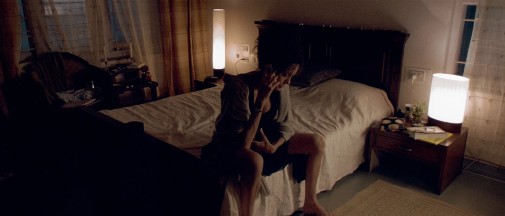
A Mighty Heart dramatizes the real-life tragedy detailed in Mariane Pearl's memoir. In 2002, her husband, Wall Street Journal reporter Daniel Pearl, was kidnapped in Karachi, Pakistan. Supporters of British terrorist Omar Sheikh claimed responsibility for the crime as well as the journalist's eventual murder, a beheading captured on video. It's a horrific story that the picture tells with admirable restraint. Focusing on the procedural aspects of the search for Daniel, Winterbottom portrays the emotional toll such horrors had on everyone involved, paying particular attention to Mariane, who was pregnant at the time of the events.
Jolie's casting provoked an understandable stir and is still a polemic today. Born in France, Mariane Pearl is the daughter of an Afro-Cuban mother and Dutch father, possessing a complex heritage that includes Chinese ancestors. Angelina Jolie is white and wore both a curly wig and brown contact lenses to resemble Mariane better. Justifiably, some have seen this as an example of blackface. For her part, Mariane Pearl has defended Jolie's casting, indicating that the actress was her choice too. For my part, I feel conflicted about the issue but won't write about it further since that's not the focus of this piece. However, if you wish to read more on the subject, I recommend this Seattle Times article published in June 2007.
Issues of miscasting aside, the performance is worthy of much praise.
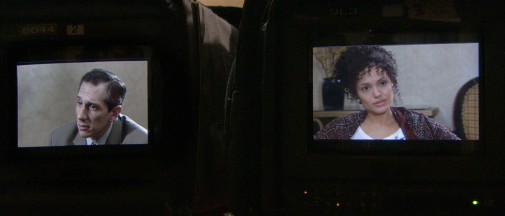
It's easy for an actor to indulge in emotion when portraying such a heightened level of distress as Jolie is asked to do here. But, sagaciously, the actress denies the temptation. Instead, she lets the frustration and pain register through Mariane's skillful avoidances, her shields, and the cracks herein. Reacting to a CNN interview within the film, someone comments that you wouldn't know her husband has been kidnapped for six days by looking at Mariane. Jolie takes that statement to heart and builds her portrayal of a woman in crisis by adopting a strategy that lets the viewer look deeper into the character's behavior to see signs of what's kept at bay. For one of the few modern movie stars, Jolie delivers a very in-star-like performance in A Mighty Heart – that's not a bad thing, mind you.
In other words, the performance represents a tricky resolution to the conundrums intrinsic to a muted character study intent on plumbing the depths of unimaginable sorrow. As Mariane, Jolie plays a crying scene like a person who doesn't want to cry, who doesn't allow the tears to fall through will alone. The deliberate behavioral patterns indicate both obstinance and a survivalist instinct. Thus envisioned by the Winterbottom film, Mariane Pearl isn't an easy character to resolve. She's so intrinsically reactive, so internalized. Another puzzling element is the art of acting how someone listens. Angelina Jolie exudes intelligence as Mariane when the woman is made to assimilate detailed information, her eyes always laser-focused.
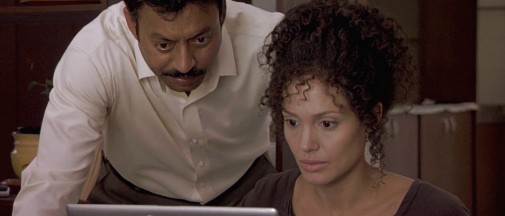
Then, there's the quality of her voice work. At the drop of a hat, without changing her face of determination, a cajoling attitude can bubble over into frustrated anger in the actress' cadence. Or, more tragically, strength may lose its power and flicker out like a flame in the wind. Following that logic, both Jolie and Winterbottom tend to privilege sound over the image when it comes to Mariane's most dispiriting episodes. So often, when she shouts, we only see the back of her head. In another instance, she might remove herself from the scene, leaving everyone, including the camera, behind in an attempt to cool off and keep her inner life a secret.
Shining a light on how Mariane compartmentalizes her worries, Jolie hides the depths of agony behind barely held together stoicism. It gets more apparent as the situation worsens and the effort becomes more strenuous. However, it's there from the start. When Daniel doesn't show up to dinner, Mariane is the perfect hostess, but her smile doesn't reach the eyes. Instead, there's tension in the air, in the lines of her body and movements. Such ominous qualities make the small talk between friends feel like a performance inside another performance. The difference between such falsity and true joy is evident when you see the real thing. Of course, the only place where such positive sentiment exists is in remembrance.
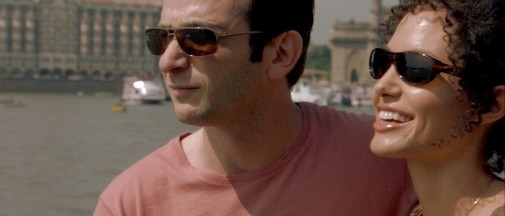
Every scene she shares with Dan Futterman is a light, frothy song of devotion. Subduing her incandescence but still sporting a radiant smile, Jolie evokes sweet ease, allowing us to see Mariane with her guard down. She's joyful and relaxed, her body free of tension and responding to his every move with a show of excitement, a delicate softness reserved for brief interludes alone. In short, Jolie's great at being in love on film, sweeping the audience up in her character's passionate ardor. Yet, when loss manifests, it hurts all the more because we have some idea of what's been taken away.
It's romantic without being sentimental about it, without jeopardizing the rest of the characterization. Tonal variety is essential because the film's focus on suffering can bring about a certain homogeneity of action, a continuous parade of scenes where Jolie is asked to worry while interacting primarily with phones and screens. It's incredible how dynamic she can make all of this, using minute gradations of mood to differentiate scenes, to give the impression of a knot, twisting and tightening ever so slightly with each passing minute.
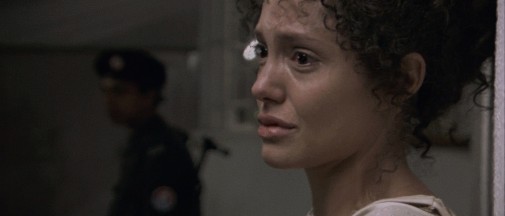
At last, there's "the scene," the most unbearable moment in the entire picture, the most excoriating too. It happens as the widow realizes she's a widow, and it hurts to think of, let alone to watch the thing unfold. Jolie's Mariane swallows down her sobs, her tears threatening to fall at last. We see that mask start to crumble, tremors, and popped veins galore. And then, she exits the scene, as she always does, running away from the camera at this most delicate point. Our gaze still follows her, through it all, chasing after the bereaved woman, thirsty for the fresh blood of grief. When alone, she collapses, screams, exorcising some mighty demons. Some might call the cry an example of catharsis, but that doesn't do it justice. It's too shattered to be cathartic.
Instead, it's ragged and wretched, so raw one can feel how it ravages the actress' throat. Then comes another wave, a tsunami, a flash of denial. Mariane returns to the other people around and talks as if bargaining for a different fate. Jolie's eyes shine with tears, naked despair vibrating off their bugged-out frenzy. As the news of the video hit, incredulity sets in. It breaks down into a spark of rage, dying down quickly until all we're left with is an exhausted person, emptied of feeling, grief in its purest form. There's no more energy left, not even enough to cry a lonely tear, to whimper. It's some of the best work Jolie has ever done on-screen, and, in a different world, it would have made one hell of an Oscar clip.
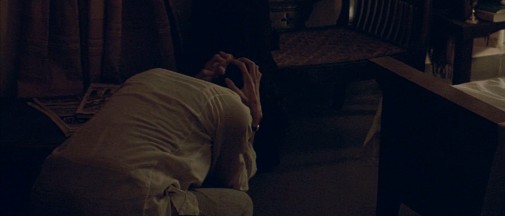
After A Mighty Heart premiered at the Cannes Film Festival, Angelina Jolie quickly earned some well-deserved awards buzz. Speaking strictly of the prominent Oscar precursors, the actress won nominations for the Golden Globes, SAG, and Critics Choice Awards. Nevertheless, on Oscar nomination morning, Jolie's name was nowhere to be found. Instead, AMPAS chose to recognize Cate Blanchett in Elizabeth: The Golden Age, Marion Cotillard in La Vie en Rose, Julie Christie in Away From Her, Laura Linney in The Savages, and Elliot Page in Juno. In the end, the race whittled down to Cotillard vs. Christie, with the French actress triumphing. Linney was the likely fifth-placer despite delivering an outstanding performance, taking Jolie's potential spot in the Best Actress quintet.
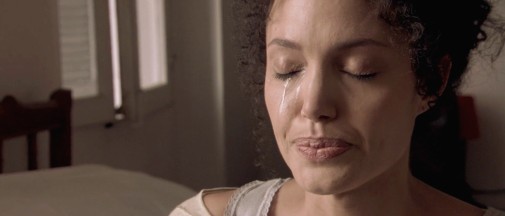
A Mighty Heart is available to rent on Google Play, Youtube, Amazon, and Cineplex.